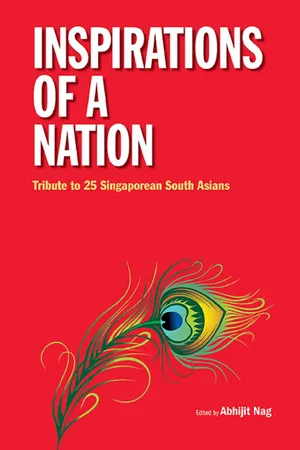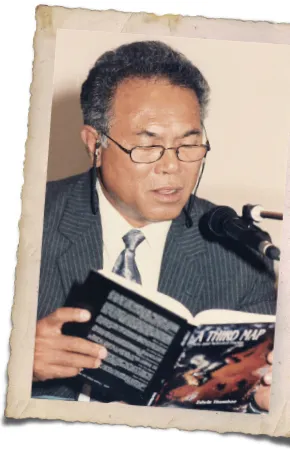
- 116 pages
- English
- ePUB (mobile friendly)
- Available on iOS & Android
About This Book
This book pays tribute to 25 Singaporean South Asians who pioneered and excelled in their respective fields from 1950 to 2015. It is meant to be a 'quick take' on 25 Singaporean South Asian personalities, across a broad spectrum of professions and activities, who believed in the value and virtue of service to the community and gave the best of themselves.
They had a sense of mission in their professions, dedicated to what they were doing and fostered a sense of community and nation. Many of them laid foundations that triggered the transformation of the island, including sportspeople whose records have stood the test of time. They were a people of their time whose work many may not know but which we hope will inspire others. This book is timely, for those who want to get a snapshot appreciation of the contributions of Singaporean South Asians.
Contents:
- Preface
- Acknowledgment
- The Sound of Music (Alex Abisheganaden)
- The First NSMan (Lt-Col Albel Singh)
- In a Class of His Own (Velauthur Ambiavagar)
- Bringing the News (Ananda Perera)
- Stamping his Mark (Bala Supramanion)
- Breaking the Mould (Balbir Kaur)
- Broadcast Guru (S Chandra Mohan)
- Shots Under Fire (Chellappah Canagaratnam)
- The Unionist (Devan Nair)
- The National Bard (Edwin Thumboo)
- All for the Best (Eugene Wijeysingha)
- Feats of Glory (Glory Barnabas)
- Game for Life (George Suppiah)
- Pioneer Doctor (Dr James Supramaniam)
- Going the Distance (K Jayamani)
- Labour Leader (G Kandasamy)
- Army Builder (Kirpa Ram Vij)
- Sports Aficionado (SS Dhillon)
- Born to Run (Sergit Singh)
- The Silat Champion (Sheik Ala'uddin)
- Physician First (Dr BR Sreenivasan)
- Nature's True Child (Subaraj Rajathurai)
- Dream Run (PC Suppiah)
- Dancing in the Ring (Syed Abdul Kadir)
- Runner-Philosopher (UK Shyam)
Readership: Schools & Educational Institutions; Libraries both local and overseas; Indian Diaspora; Business & Professional Groups; Government Bodies; Community Centres and Indian Activities Groups.
Singaporean South Asians;Inspiration;Albel Singh;Kripa Ram Vij;Bala Subramanion;Dr BR Sreenivasan;Velauthur Ambiavagar;Dr James MJ Supramaniam;S Chandramohan;Ananda Perera;Chellappah Canagaratnam;George Suppiah;G Kandasamy;Eugene Wijeysingha;Edwin Thumboo;Alex Abisheganaden;Subaraj Rajathurai;PC Suppiah;Glory Barnabas;Syed Abdul Kadir;UK Shyam Key Features:
- Evokes emotional response to foster ownership of a nation
- Includes personalities across a broad strata of society
- Seeks to add human faces to memory
- Motivates others to be inspired by these achievements
- Triggers nostalgia and conversation and excite others to contribute to SMP
- Develops heritage content by offering new information
- Serves to educate "make-up" communities on some of our pioneers
Frequently asked questions
Information
 | BY ABHIJIT NAG THE NATIONAL BARD There is the public Edwin Thumboo and the private Edwin Thumboo. One writes for the nation, but who is closer to the reader? |

Table of contents
- Cover Page
- Title
- Copyright
- Contents
- Preface
- Acknowledgment
- The Sound Of Music — Alex Abisheganaden
- The First NSman — Lt-Col Albel Singh
- In A Class Of His Own — Velauthur Ambiavagar
- Bringing The News — Ananda Perera
- Stamping His Mark — Bala Supramanion
- Breaking The Mould — Balbir Kaur
- Broadcast Guru — S Chandra Mohan
- Shots Under Fire — Chellappah Canagaratnam
- The Unionist — Devan Nair
- The National Bard — Edwin Thumboo
- All For The Best — Eugene Wijeysingha
- Feats Of Glory — Glory Barnabas
- Game For Life — George Suppiah
- Pioneer Doctor — Dr James Supramaniam
- Going The Distance — K Jayamani
- Labour Leader — G Kandasamy
- Army Builder — Kirpa Ram Vij
- Sports Aficionado — SS Dhillon
- Born To Run — Sergit Singh
- The Silat Champion — Sheik Ala’uddin
- Physician First — Dr BR Sreenivasan
- Nature’s True Child — Subaraj Rajathurai
- Dream Run — PC Suppiah
- Dancing In The Ring — Syed Abdul Kadir
- Runner-Philosopher — UK Shyam